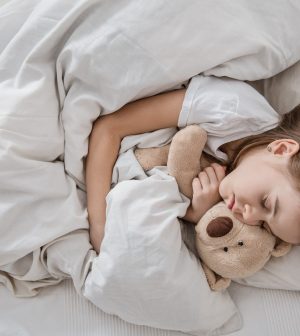- Could Your Grocery Store Meat Be Causing Recurring UTIs?
- Are You Making This Expensive Thermostat Error This Winter?
- Recognizing the Signs of Hypothyroidism
- 10 Strategies to Overcome Insomnia
- Could Artificial Sweeteners Be Aging the Brain Faster?
- Techniques for Soothing Your Nervous System
- Does the Water in Your House Smell Funny? Here’s Why
- Can a Daily Dose of Apple Cider Vinegar Actually Aid Weight Loss?
- 6 Health Beverages That Can Actually Spike Your Blood Sugar
- Treatment Options for Social Anxiety Disorder
Weighted Blankets May Not Help Troubled Children Sleep

Weighted blankets are trendy items, largely based on the idea that the pressure of a heavy blanket will help a person more easily slip into slumber.
But they do little to help troubled children sleep better, a new study has found.
There was no difference in sleep between weighted and normal blankets among a group of 30 children ages 6 to 15 adopted from foster care in Texas, according to a report published recently in the Journal of Clinical Sleep Medicine.
“We were somewhat surprised to find no differences in either objective or subjective sleep variables based on blanket type,” said researcher Candice Alfano, a University of Houston psychology professor and sleep expert.
For the study, the group of children were asked to use weighted blankets – between 5 and 10 pounds – for two weeks, and their normal blanket for another two weeks.
During the entire month, their sleep was monitored continuously using both sleep diaries and actigraphs — a wristwatch-like device that tracks sleep patterns.
The weighted blankets did not help kids go to sleep easier or sleep better, results show.
Weighted blankets also did not seem to improve the sleep of children who’d been abused or neglected, researchers said.
Children in foster care can have persistent sleep problems, including trouble falling asleep, waking in the night and nightmares, researchers said.
“We have heard from at least some foster and adoptive parents that a weighted blanket has seemed to help their child sleep better, so we wondered,” Alfano said in a university news release. “Theoretically, use of the weighted blanket might reduce these symptoms and improve sleep.”
Unfortunately, weighted blankets made no difference in this small group of children.
However, Alfano said the idea remains worthy of further study.
“Children who have histories of maltreatment are a very diverse group, so more well-controlled studies using larger samples of children are still needed,” Alfano said.
More information
The Sleep Foundation has more on weighted blankets.
SOURCE: University of Houston, news release, May 23
Source: HealthDay
Copyright © 2026 HealthDay. All rights reserved.










